Department News
Note from the Chair | Hispanic Linguistics Symposium | Song Festival | Teatro VIDA
Chiricú Celebrated | MESDA Lecturers | Guest Speakers | Scholarships | Upcoming Events
Note from the Chair
Dear alumni and friends,
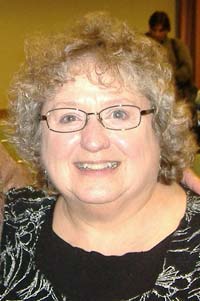
Catherine Larson
Greetings from Bloomington! As Bob Dylan observed back in the ‘60s, “the times they are a-changin'.” The first big change you have no doubt noted is the new electronic format of La Gaceta Internacional. Although we recognize that not every single person in the world is online, we know that most of you are, and we made the decision to go forward with this new approach to help keep our planet a bit greener, as well as to save our precious resources to better help students and faculty accomplish their goals. We hope that you like the electronic format and ask that if you know of someone who might not get the Gaceta this way, you pass on names and addresses so that we can follow up. Please also let us know if your email address changes. As Garcilaso de la Vega gently reminded us, change is always with us: students graduate and begin their new lives, new students arrive ready to take their places, faculty members retire and new faculty join our community of scholars and teachers. . . such is the nature of change in life and in academia. One change that I must share with you is a loss, the passing of former colleague and department chair Frances Wyers. Another is that I will complete my term as department chair this spring, and we have selected a new chair, Steven Wagschal, and have set priorities for the future.
Our students and faculty have been busy since last I wrote. We have almost 50 tenure-stream and non-tenure-track faculty members, who share teaching duties with 86 graduate student instructors. This talented instructional staff includes Associate Instructor Mike Mosier, Lecturer Israel Herrera and Professor Erik Willis, who were honored for their outstanding teaching, and the winner of the Mentor of the Year award, Professor Deborah Cohn. Professor Gustavo Sainz is now enjoying retirement at the Centro Cultural Gustavo Sainz in Saltillo, México. Two additional faculty members retired in December: Professors Olga Impey and Luis Dávila. (The next addition of the Gaceta will provide much more information on these colleagues.) Assistant Professor Anke Birkenmaier, whose area of research specialization is Caribbean literature, joined us in January 2011 after spending the fall 2010 semester in Germany on a Humboldt fellowship. In August we welcomed a new director of the Basic Language Program in Spanish, Allen Davis—and I am delighted to report that he appears to be a wonderful fit for the department and the BLP, which serves the thousands of students who take Spanish. We are pleased to announce the approval of what we believe is the only PhD minor in Catalan in the country. Our undergraduate students continue to do well—a large number were elected to join Phi Beta Kappa, many won major prizes and awards, and others still spent summers, semesters or the entire academic year studying abroad. Our majors indicate their satisfaction with their education with a 4.59/5.00 rating.
Our faculty members—and many graduate students, as well—are actively publishing books and articles, are busy giving conference papers and invited lectures, and are winning prestigious grants and fellowships. In just one sterling example of this research excellence, fifteen graduate students and faculty presented at the recent Hispanic Linguistics Symposium in Athens, GA, and four of the grad students were honored with HLS Graduate Student Awards: Robert Baxter, Stephen Fafulas, Matthew Kanwit and Megan Solon. Last fall began with a superb talk by Judy Nantell as the Merle E. Simmons Distinguished Alumni lecturer, and the previous fall, we enjoyed an equally stimulating MESDA lecture by Janet Dudley-Eshbach. We continue to enrich the intellectual life of the department with our own Brown Bag Lecture Series in literature and linguistics and invited lecturers from the US and around the world; a recent lecturer was the acclaimed Portuguese filmmaker, Pedro Costa. In addition, several activities—some of which may ring a bell for many of you—help to create a stimulating environment in Ballantine Hall. For the sixth year in a row, VIDA, which performs Spanish-language theater for the IU and Bloomington communities (and, last year, also took its plays on the road to Ohio University and the IndyFringe Theatre in Indianapolis) offered some wonderful examples of Hispanic theater. Congratulations to founding director Marda Rose and current director Teresa Parmer for their work. Undergraduate and graduate students and faculty enrich another lively forum for language learning in the weekly coffee hours in Portuguese, Catalan and Spanish. We have sponsored film festivals, the IU World Language Fest and the Spanish and Portuguese Song Festival; our linguists hosted the 2010 Hispanic Linguistics Symposium, and our graduate students sponsored the annual GSAC Conference. Luis Dávila was honored as part of a celebration of 25 years of the literary journal Chiricú.
Ours is a vibrant department whose faculty and staff work exceptionally hard to serve thousands of students and to do important research in language, literature, linguistics and culture. I am grateful for the talent and good will exhibited on all levels, and especially for the service provided by the program directors (Clancy Clements, Patrick Dove, Kimberly Geeslin, Darlene Sadlier, Edgar Illas, Juan Manuel Soto and Allen Davis) and by the Associate Chair, Steve Wagschal. I am also truly grateful for the generous alumni and friends of the department who have made contributions that have enabled us to help our students. I am confident that virtually every person reading the Gaceta knows—and, hopefully, has experienced—the value of study abroad in transforming students’ lives. Our department uses donor contributions to support undergraduate study abroad in programs in Mexico, Spain and Argentina, with our largest scholarship support in the last two years, generously provided by Anne and Gene Culler, helping students study in Peru. Donor support of graduate students takes the form of fellowships and grants—to attract the best and brightest students to our MA or PhD programs, to support grad student research during the summers, to help fund travel to professional conferences so our grad students can gain experience presenting papers in scholarly meetings, or to help those who are finishing dissertations, for example, by providing a one-course teaching release so that they can focus more attention on their research. We help many students each year but, frankly, we would love to be able to support more of them and in a more substantive way. Elsewhere in this issue of La Gaceta Internacional, you will learn of a scholarship for Indiana Spanish teachers, given in memory of Professors Dan Quilter and Russ Salmon. Several other donors have supported graduate and undergraduate students in our department in honor or in memory of a beloved faculty member or in memory of a student from our department or a family member who has passed away; one beautiful example is the endowment that August Aquila and Emily Haliziw have established to fund graduate student research in Latin America, which honors the memory of Merle E. Simmons; another is an undergraduate study abroad scholarship that our faculty colleague Manuel Díaz-Campos created last year in memory of his father, Pedro Díaz Seijas. Others yet, simply honoring the quality of the education they received at IU, have made large and small contributions that allow the department to decide where their donation might best be used. Please know that contributions in any amount would be welcomed beyond measure, because they allow us to help students in meaningful ways every single year. Thank you.
I will close by reminding you that we would love to hear from you, and if you find yourself visiting Bloomington, please drop by and say hello.
With best wishes,
Catherine Larson
larson@indiana.edu
Department Hosts Hispanic Linguistics Symposium
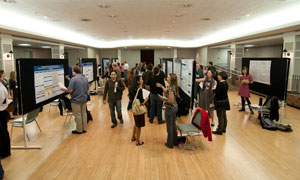
Poster presentations at the HLS
In October of 2010 the department's program in Hispanic Linguistics organized and hosted the Hispanic Linguistics Symposium, which is arguably the most widely recognized forum for disseminating the results of research on all areas of Hispanic Linguistics. The symposium brings together researchers who work in Europe, the United States, and Latin America. What makes this meeting unique is the inclusiveness across areas of linguistic research, such as phonetics, phonology, morphosyntax, semantics, pragmatics, sociolinguistics and second language acquisition in combination with its unique focus on Spanish, Portuguese and the languages with which these two languages are in contact. The conference has doubled in size since it was last hosted at Indiana University in 2000, and the high quality of the papers it attracts ensures engaging debate, cross-disciplinary impact and multiple opportunities for collaboration.
The theme for the 2010 Hispanic Linguistics Symposium was “Variation and Linguistic Theory”. Our focus on language variation was chosen to address a recent surge in interest in variability and the way different language theories can account for the inherent changes in language across time, geographic region and speech context, allowing us to showcase the primary strength of our Hispanic Linguistics program. Although the members of the organizing committee work on a broad range of areas of linguistics, both theoretical and applied, and conduct research from a variety of theoretical perspectives, each of us conducts independent research that addresses variation in language in some way. In keeping with the conference theme, each of the four invited keynote speakers works on language variation and change. These speakers included A. Jacqueline Toribio (U. of Texas), Robert Bayley (U. of California-Davis), Ricardo Otheguy (City University of New York's Graduate Center), and Richard Cameron (U. of Illinois-Chicago). A refereed volume, co-edited by Kimberly Geeslin and Manuel Díaz-Campos, was published in 2011 by Cascadilla Press with the collection of the very best papers from this meeting.
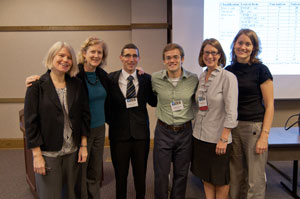
Professors Blackwell and Quesada (U. of Georgia), students
Stephen Fafulas and Matt Kanwit, Professor Geeslin and
Aarnes Gudmestad (IU alumni) after a session on second language
acquisition
Beyond the regular conference program for the Hispanic Linguistics Symposium, we also hosted two concurrent one-day workshops. These workshops focused on Caribbean Spanish and variation in pragmatics, and each brought in experts in those areas of research, providing unique opportunities for scholars working on related topics as well as for our own graduate students. The workshop on Caribbean Spanish was designed specifically to discuss original data in order to better understand the system and processes that characterize Caribbean Spanish. The term "Caribbean Spanish" was broadly defined to include any variety of Spanish that is based on geographic contact with the Caribbean, or is a derivative of a Caribbean dialect of Spanish, such as Puerto Rican Spanish in Ohio, Dominican Spanish in New York, or Cuban Spanish in Miami. The workshop on pragmatic variation was designed to bring together active researchers in the field to address theoretical, methodological, and empirical issues related to first and second language pragmatics research. It focused on the intersection of sociolinguistics and pragmatics across varieties of Spanish and the impact of variation on the learning of second language pragmatics.
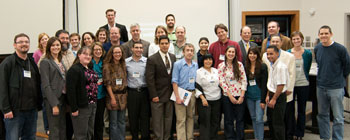
IU faculty, students and alums with Dr. Robert Bayley after
his keynote address
In addition to the opportunities for dissemination of research and collaboration that the Hispanic Linguistics Symposium and the two full-day workshops provided faculty and graduate students, each of these events was especially significant in enhancing our goal of providing outstanding undergraduate education. The conference theme of variation and linguistic theory corresponds nicely to the curriculum in our advanced-intermediate-level Introduction to Hispanic Linguistics (S326) course as well as our more specialized courses in phonetics, syntax, sociolinguistics, pragmatics and language acquisition at the 400-level. Students from all of these classes were able to attend the workshops and the conference events free of charge, granting them a unique opportunity to apply what they had learned in the classroom to real problems in linguistic investigation. Thus, regardless of the level of background in Hispanic Linguistics, this conference and its associated workshops provided a singular learning opportunity for all, and a chance for students and faculty outside Indiana University to learn more about the programs offered here.
Festival Showcases Talents and Fosters Language Learning
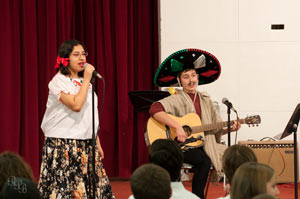
S280 students Lily Luna and Kara Cifizzari
(with hat and moustache) perform to the
delight of the audience.
The Department was pleased to present the first Indiana University Spanish and Portuguese Song Festival in April 2011 and based on exuberant participation and rave reviews, plans to make it an annual event. An eager audience packed the IMU Frangipani Room in anticipation of the nine acts presented by current and former students of the Department, who performed in Spanish or Portuguese and included selections representative of pop and rock artists from Latin America and Spain.
A jury panel of faculty and graduate students from the Department of Spanish and Portuguese, Latin American Music Center, and the Department of Folklore and Ethnomusicology was charged with selecting the top three performances and ultimately the winner. Congratulations to finalists Sarah Mosier and Daniel Avon, both of them students of Portuguese, and to the winner, Tiffany Hogan, a Spanish major.
Festival organizer Israel Herrera, a lecturer in the Department of Spanish and Portuguese, said the event was created to offer IU students a space to practice Spanish and Portuguese through song. "I decided to create this event after realizing that many of my students were involved in bands and had skills in singing or playing musical instruments," Herrera said. "I am very passionate about music, so I combined all these details and added the language ingredient."
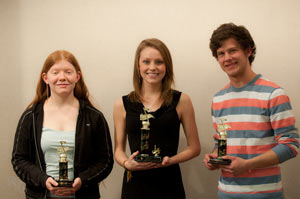
Congratulations to finalists Sarah E. Mosier,
Tiffany Hogan and Daniel A. Avon
The festival was a collaboration among the Department of Spanish and Portuguese, The Center for Latin American and Caribbean Studies, Latino Studies, La Casa, and the International Latin American and Spanish Student Organizations. Special thanks to Herrera for his vision to initiate this event, and to Catherine Larson, Juan Manuel Soto and Berta Chopite for their support, as well as to those who served on the jury panel and pitched in to make the event run smoothly.
Teatro VIDA Going Strong
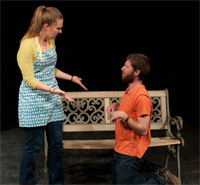
In the fall 2011 Transformaciones show,
Margaret Duvall and Marc Fishman
portray a young couple in Osvaldo Dragún's
"Historia del hombre que se convirtió
en perro"
In its 2011 season, Grupo de Teatro VIDA staged Transformaciones, a presentation of three short Spanish-language plays that portrayed unexpected changes in characters' lives through fantasy and imagination, at the Bloomington Playwright's Project and at the IndyFringe Theater. In fall 2010 the group presented Relaciones, four one-act plays at the BPP and the IndyFringe Theater and in spring 2011 at the Baker Center Theater at Ohio University and the John Waldron Auditorium in Bloomington.
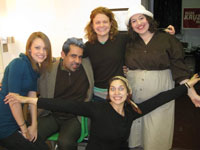
Cast members from the 2010-11
production of Relaciones:
Tiffany Hogan,Israel Herrera,
Marcie Deffenbaugh,
Maya Wahrman,
and Jennifer Burch (in front)
The Spanish language performance group aims to promote language learning by involving students and native speakers of Spanish in the performance of Spanish theater. Their goal is to produce plays that foster cultural understanding and promote the richness of Hispanic culture and experience. Marda Rose, PhD candidate in Hispanic linguistics, founded VIDA six years ago; the current president/producer is Teresa Palmer, a PhD candidate in literature.
To learn more about VIDA, send an email to vida@indiana.edu or visit the group's page at www.indiana.edu/~vida.
Chiricú Celebrated
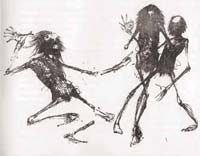
Commemorated 35 years of the publication Chiricú.
On October 14, 2011, the Chicano-Riqueño Studies Program commemorated 35 years of the publication Chiricú, a journal of Latino literature, arts and culture. The event took place at the Lilly Library, and featured readings by Arturo Rosales, Professor Emeritus of History at Arizona State University, and Norma Alarcón, Professor Emeritus of Ethnic Studies at the University of California, Berkeley. Professors Rosales and Alarcón reflected on the political fervor of the 1970s and the spirit of a movimiento that gave rise to Chiricú, first published in 1976 by Professor Luis Dávila and a cohort of graduate students. Along with a standing-room audience, they paid tribute to Prof. Dávila’s four decades of promoting the study of Latino literature and culture at Indiana University. Professor Dávila arrived in Bloomington in 1969. He served as founding director of Chicano-Riqueño Studies and retired at the end of fall 2011.
The 35th Anniversary issue of Chiricú is due out this spring; it will include contributions by Professors Rosales, Alarcón and Dávila. For more information, contact John Nieto-Phillips, Director, Latino Studies & Chicano-Riqueño Studies: jnietoph@indiana.edu
Global Experience, National Expertise
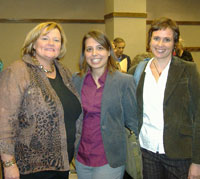
Janet Dudley-Eshbach with
graduate students Paloma Fernández
and Silvia Roca-Martínez
Dr. Janet Dudley-Eshbach, President of Salisbury University in Salisbury, MD, gave our 2010 Merle E. Simmons Distinguished Alumni Lecture. Dr. Dudley-Eshbach graduated from Indiana University in three years with a BA degree in Spanish, summa cum laude, a 4.0 grade point and a Phi Beta Kappa key. Having spent one year at the Universidad Ibero-Americana as an undergraduate, she then studied for her PhD at the Colegio de México.
Dudley-Eshbach gave an intriguing title to her talk: “Sign Seen at Water's Edge on a Beach on Isla Mujeres: 'You Are Not Away.'” As she elaborated: “I relate how my studies and travels led to my becoming a university president. These reflections suggest ways in which the study of foreign languages and cultures is the very best preparation for successes--in one's life and career.” She spoke movingly and humorously about the professors with whom she studied, including Russ Salmon and John Dyson. She emphasized that she is “a university president who is, first and foremost, even in her dreams, a Hispanist.” A lively “meet and greet” reception preceded the lecture and animated discussion followed it.
Dr. Dudley-Eshbach began her administrative career at SUNY-Potsdam, first as departmental chair, then Dean of the School of Arts and Sciences, and finally University Provost. She next accepted the presidency of Fairmont State University in West Virginia, before moving to Salisbury University in 2000. She has published numerous articles and reviews and has recently given talks on academia.
She has received many prestigious honors at the university, state, national and presidential levels. She is one of Maryland’s Top 100 Women. President Clinton invited her to participate in his Global Initiative. President George W. Bush appointed her a member of the Review Board for the 2006 Presidential Rank Awards. The American Association of University Women gave her its Outstanding Achievement Award. From the American Red Cross she received the Elizabeth Dole Shattered Glass Award. In 1998 Change magazine named her one of 40 Young Leaders of the Academy nation-wide.
Dr. Dudley-Eshbach is proud of Salisbury University’s emphasis on “diversity, globalism, and inclusiveness.” She has created an international campus by attracting foreign faculty and students and by offering opportunities for Salisbury students and faculty to study or teach abroad.
MESDA Lecturer Gives Insight into Muñoz Poetry
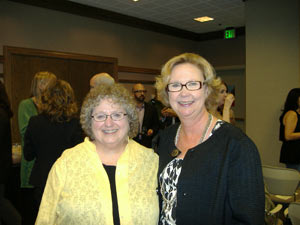
Professor Catherine Larson and MESDA guest Judith Nantell
The Department’s 16th annual Merle E. Simmons Distinguished Alumni (MESDA) lecture took place on September 23rd, 2011. We were fortunate to have as our speaker Dr. Judith Nantell, who received her MA (‘74) and PhD (‘78) from our department. Dr. Nantell also holds a BA (‘70) in Spanish, English, and Secondary Education from Cleveland State University. Before coming to Bloomington, she also studied at the Centro de Estudios Sorianos under the direction of Julián Marías. At IU, she wrote her dissertation under the guidance of Professor Luis Beltrán, on the topic “Rafael Alberti’s Vision of Spain 1930-1955: The Merging of Politics and Poetics.” She has held professional appointments at the University of Wisconsin, Florida State University, and at the University of Arizona, where she has been on faculty since 1987. She is currently Professor of Spanish and Vice Dean of the College of Humanities at the University of Arizona. Dr. Nantell’s publications on Modern and Contemporary Spanish poetry include Rafael Alberti’s Poetry of the Thirties: The Poet’s Public Voice (University of Georgia Press, 1986, winner of the South Atlantic Modern Language Association Award) and The Poetry of Francisco Brines: The Deconstructive Effects of Language (Bucknell University Press, 1994). Her teaching has been recognized by the University of Arizona, where she was awarded the College of Humanities Distinguished Faculty Teaching Award. Indeed, she evinced her abilities as a gifted teacher early in her career: while she was a student at IU, she earned the Associate Instructor Teaching Award in 1977. Regarding her invaluable service to her current institution, she was recognized with the Dean’s Office Honor in Recognition of Extraordinary Contributions and Service to the College of Humanities.
In her opening remarks, Dr. Nantell spoke first about Professor Merle E. Simmons, offering several wonderful anecdotes about him from her time at IU. She then launched into the topic of her lecture. Her most recent work focuses on the contemporary Spanish poet, Luis Muñoz (b. Granada, 1966), who has published five books of poetry, four of which were recently collected under the intriguing title Limpiar pescado and published by Visor in 2005. Dr. Nantell explained that she was fortunate to get to know Muñoz during time she spent at the Residencia de Estudiantes in Madrid. His poems were the subject of her enticing lecture “Syntactically Silent Subjects: Luis Muñoz and Poetry of Ellipsis.” Dr. Nantell offered close readings of several of Muñoz’s poems, with special attention to “Dejar la poesía.”
Guest Speakers
The department hosted a number of invited scholars this year, offering presentations on a variety of exciting new research to students and colleagues in the university community. Guest speakers and their lectures included:
Jens Andermann (University of London), "Memory in the Expanded Field: Postdictatorial Landscapes in Argentina and Chile"
Pedro Costa (Portuguese filmmaker and internationally-acclaimed director), was in town for a full retrospective of his films at the IU Cinema
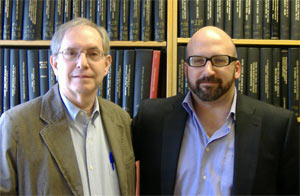
Frederick De Armas and Steven Wagschal
Frederick De Armas (University of Chicago), "Don Quixote Among the Saracens: A Clash of Cultures and Literary Genres"
Luciano García Lorenzo (Consejo Superior de Investigaciones Cientificas, Madrid), "Política cultural y teatro clásico en la España última"
Valerie Hegstrom (Brigham Young University), offered an acting/directing workshop on Spanish Golden Age theater
Javier Krauel (University of Colorado at Boulder), "Joan Maragall and the Affects of Catalanism"
Adriana Lisboa (author and translator), "Recent Trends in Contemporary Brazilian Prose Fiction"
Hèctor López Bofill (Universitat Pompeu Fabra in Barcelona), public videoconference "La independència i la realitat"
Howard Mancing (Purdue University), "Countdown to the Novel: 3 (Theories), 2 (Nations), 1 (Prototype)"
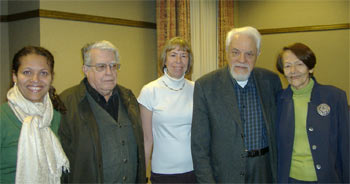
Graduate student Mazinha Hauskrecht,
Professor Emeritus Heitor Martins, Professor Darlene Sadlier,
guests Cícero Sandroni and Laura Sandroni
Cícero Sandroni (journalist, editor, translator, author), "Euclides and Joaquim Nabuco Today"
Scholarships
IAATSP Scholarship Honors Memory of Professors
The IAATSP (Indiana chapter of the American Association of Teachers of Spanish and Portuguese) has created a $1200 scholarship in memory of Daniel Quilter and Russell Salmon, two beloved IU professors of Spanish. This scholarship is for Spanish K-12 teachers who would like to study in a Spanish-speaking country; it is granted only to Spanish teachers in Indiana. The recipient of the scholarship should:
- have been a member of the IAATSP for at least three years;
- use the money to help defray the costs of study in a university-level program so as to acquire the highest possible level and knowledge of language and culture;
- create a teaching unit based on the study abroad experience;
- bring activities back to the classroom that will enrich teaching methodology;
- report orally on his/her experience on the summer program at the fall meeting of the IAATSP, which takes place during the IFLTA Conference;
- understand that the objectives of this study abroad experience are to improve both the mastery of Spanish and the ability to teach it.
In choosing the recipient of this scholarship, the selection committee may give preference to a teacher who has had very limited opportunities to travel or study in a Spanish-speaking country.
For more information on this scholarship, consult IAATSP’s website or Edra Staffieri, estaffieri@iquest.net .
New Scholarship Honors Venezuelan Literary Scholar
Pedro Díaz Seijas was a noted Venezuelan writer, scholar, essayist, and literary critic. He was a member of many cultural organizations in Venezuela and abroad and served as the director of the Venezuelan Royal Academy of Language and Director of Cultural Affairs at Simón Rodríguez University in Caracas. He studied at the Instituto Pedagógico de Caracas and Universidad Central de Venezuela and authored more than twenty books, among them Al margen de la literatura venezolana (1946), Introducción al estudio del ensayo en Venezuela (1947), Orientaciones y tendencias de la novela venezolana (1949), Rómulo Gallegos: Realidad y símbolo (1965), La gran narrativa latinoamericana (1976), and Historia y antología de la literatura venezolana (2 vols., 1981).
Díaz Seijas passed away in 2010 and his son, Professor Manuel Díaz-Campos, has established a $500 scholarship to honor the memory of his father's many accomplishments. The scholarship, to be awarded annually to a student who has declared a Spanish major, will be used to help defray the costs of study abroad or the costs associated with the pursuit of the major (e.g., books).
Selection criteria include:
- Major in Spanish (declared majors in the College of Arts and Sciences at IUB).
- Applicants should be current sophomores or juniors.
- Cumulative GPA of 3.00.
- Demonstrated financial need.
Applicants should submit to Jane Drake (jmdrake@indiana.edu) a one-page essay related to their interest in Latin American literature. The essay should also indicate how the scholarship could help them achieve their goals. Students planning to use the scholarship for study abroad should also submit the acceptance notification from OVST for their particular program. The Department is pleased to present this scholarship opportunity to our deserving undergraduate students, and to honor the memory of this well-respected scholar.
Upcoming Events
Spanish and Portuguese Song Festival, March 21, 2012, 6:00pm, Neal-Marshall Black Culture Center
VIDA performance: Una noche de primavera sin sueño, April 16-17, 8:00pm, Whittenburger Auditorium (IMU).
Pragmatics Festival at Indiana University, April 19-21, 2012. Visit the Pragmatics Festival. For more information visit: www.indiana.edu/~pragfest
Desencuentros: Sovereignty, Revolution and Neo-anarchism in Latin America, co-sponsored conference with the Center for Latin American & Caribbean Studies, April 20-21, 2012. See www.indiana.edu/~clacs for details.
"On the Compatibility between SLA Corpus and Variationist Research," Dr. Joseph Collentine (Northern Arizona University), April 23, 2012, 2:30pm, IMU State Room East
"The Portuguese-Speaking Diaspora" at the Lilly Library Lincoln Room, now through April 30, 2012. The materials in this exhibit represent five centuries of the Portuguese-speaking diaspora with emphasis on history, literature, religion and the arts.
MESDA Lecture, Dr. August Aquila, September 21, 2012. Check department website closer to event date for details: www.indiana.edu/~spanport